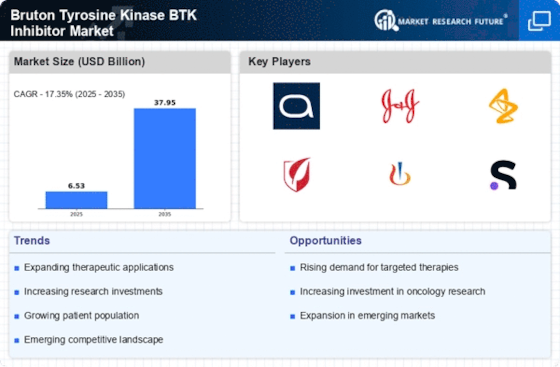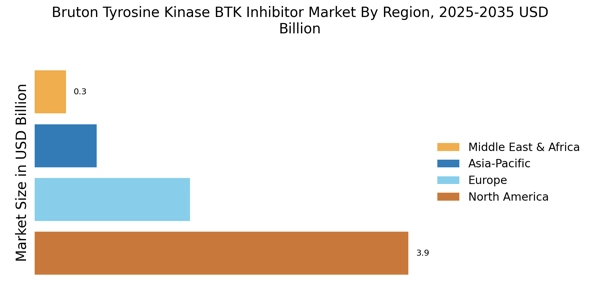Growing Awareness and Education
The growing awareness and education surrounding hematological cancers and their treatment options are pivotal in driving the Bruton Tyrosine Kinase BTK Inhibitor Market. Increased efforts by healthcare organizations to educate both patients and healthcare professionals about the benefits of BTK inhibitors have led to higher prescription rates. Campaigns aimed at raising awareness about the symptoms and treatment options for conditions like CLL have resulted in earlier diagnoses and treatment initiation. As more patients become informed about their treatment choices, the demand for BTK inhibitors is expected to rise. This trend indicates a positive trajectory for the Bruton Tyrosine Kinase BTK Inhibitor Market, as informed patients are more likely to seek out these targeted therapies.
Advancements in Drug Development
Recent advancements in drug development technologies are significantly influencing the Bruton Tyrosine Kinase BTK Inhibitor Market. The integration of artificial intelligence and machine learning in drug discovery processes has accelerated the identification of potential BTK inhibitors, enhancing the efficiency of clinical trials. For instance, the development of novel compounds that selectively target BTK has shown promising results in early-phase trials, indicating a potential increase in market offerings. Additionally, the collaboration between pharmaceutical companies and research institutions has fostered innovation, leading to the introduction of new BTK inhibitors. This trend suggests that the Bruton Tyrosine Kinase BTK Inhibitor Market will continue to evolve, with a focus on developing more effective and safer treatment options for patients.
Regulatory Approvals and Support
Regulatory approvals for new BTK inhibitors are a crucial driver for the Bruton Tyrosine Kinase BTK Inhibitor Market. The expedited review processes implemented by regulatory agencies have facilitated the swift introduction of innovative therapies into the market. For example, several BTK inhibitors have received breakthrough therapy designations, allowing for faster access to treatment for patients with limited options. This regulatory support not only encourages pharmaceutical companies to invest in BTK inhibitor research but also enhances patient access to these vital therapies. As more products gain approval, the Bruton Tyrosine Kinase BTK Inhibitor Market is poised for growth, reflecting the ongoing commitment to improving treatment landscapes for hematological malignancies.
Emerging Markets and Expanding Access
Emerging markets are becoming increasingly important for the Bruton Tyrosine Kinase BTK Inhibitor Market. As healthcare infrastructure improves in various regions, access to advanced therapies, including BTK inhibitors, is expanding. Countries in Asia and Latin America are witnessing a rise in healthcare spending, which is likely to enhance the availability of these treatments. Furthermore, partnerships between local healthcare providers and international pharmaceutical companies are facilitating the distribution of BTK inhibitors in these markets. This trend suggests that the Bruton Tyrosine Kinase BTK Inhibitor Market will experience growth as more patients in emerging economies gain access to effective treatment options, thereby broadening the market landscape.
Increasing Incidence of Hematological Malignancies
The rising incidence of hematological malignancies, such as chronic lymphocytic leukemia (CLL) and non-Hodgkin lymphoma, is a primary driver for the Bruton Tyrosine Kinase BTK Inhibitor Market. According to recent data, the prevalence of CLL has been steadily increasing, with estimates suggesting that over 20,000 new cases are diagnosed annually. This growing patient population necessitates effective treatment options, thereby propelling the demand for BTK inhibitors. Furthermore, the efficacy of these inhibitors in managing such malignancies has been well-documented, leading to increased adoption among healthcare providers. As the understanding of these diseases evolves, the Bruton Tyrosine Kinase BTK Inhibitor Market is likely to expand, driven by the need for innovative therapies that can improve patient outcomes.

















